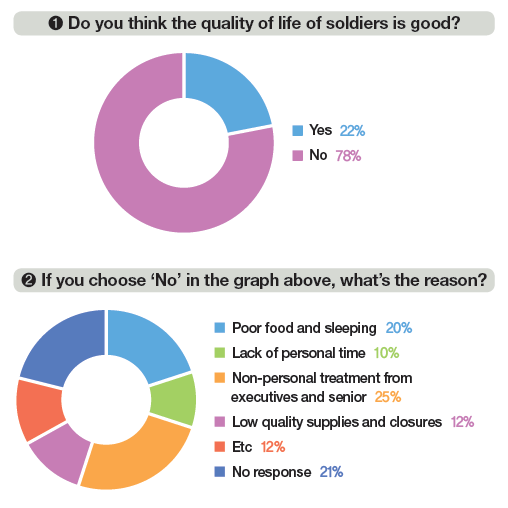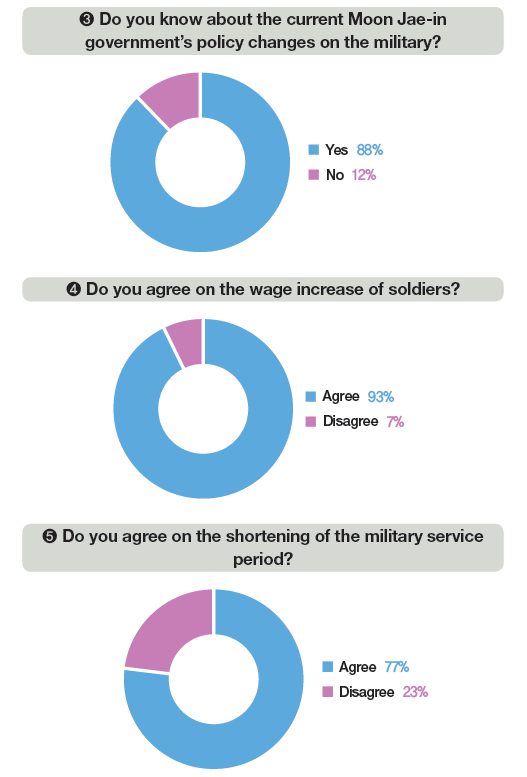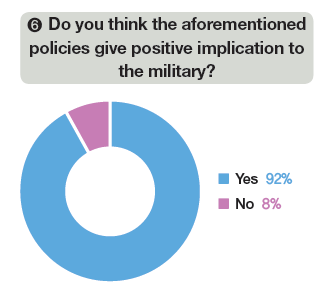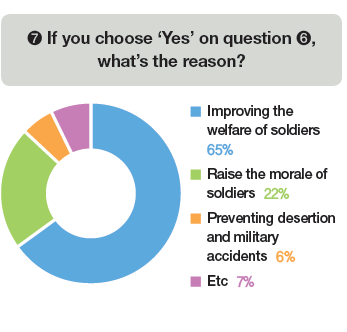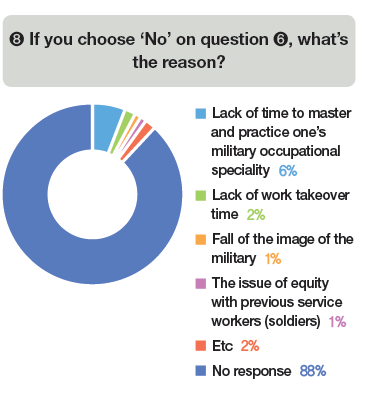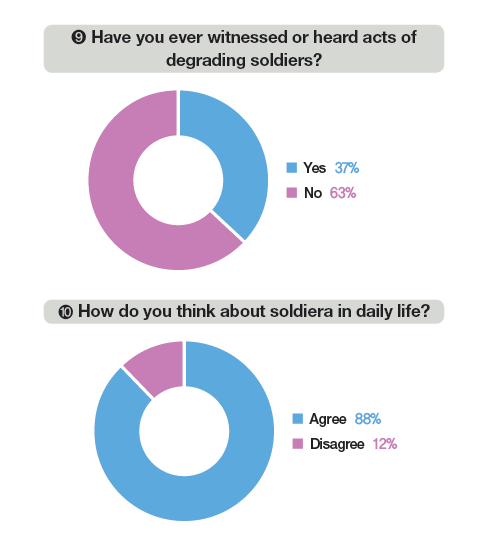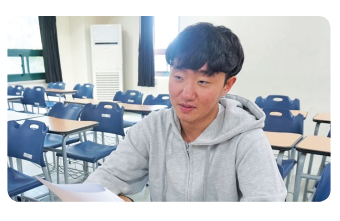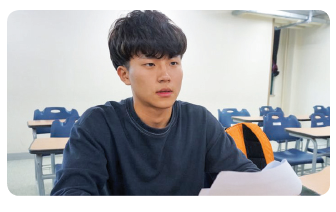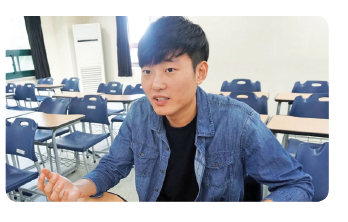The issue of military affairs has been reemerging as a result of military general Park Chan-ju and his wife’s brutality to a soldier and the K9 self-propelled gun accident. Military incidents are sensational when they occur and the attention does not easily stop. Such incidents gain the attention of many civilians living in society as well as inside the military. Living in a country in the middle of truce might be the reason we have a sensitive view about the military. Thinking about young men and their relatives, family, and girlfriends, the military is an organization which almost everyone in South Korea has come into close contact. Especially in college, young men are subject to enlistment and girls have to experience parting with friends, family, and boyfriends. Attentions to the armed forces, regardless of age and sex, has been established in society as a whole through various themes such as controversy over the pros and cons of the veterans’ extra point system, notice paid to harsh behavior, the military service period and wage development. Also, the internal and external environment in which soldiers live and the benefits they receive are always treated as important issues. With these issues in mind, the Pharos surveyed and interviewed Kyonggi University students to see what they think about the military and their awareness of soldiers’ lives.
The public is interested in policies that affect the military. The most recent example is the implementation of the Moon Jae-in government’s military-related pledges. President Moon said that from 2018, the salary of soldiers will be raised to about 400,000 won a month. He also announced that he will shorten the service period to 18 months in the future, in stages. This means that there will be major changes in policy in terms of the military. The part about the pay raise shows that the state’s treatment of young people on duty is getting better than before. To hear the opinions of both men and women about these commitments and overall awareness of the military, the Pharos conducted a survey of 100 Kyonggi University students from August 31 to September 7. Here are the results of the questionnaire.
First, 78 students answered “No” to the question that asked whether the quality of life of soldiers is good. The reasons for this were “non-personal treatment from executives and senior,” with the largest number of people, 25, choosing this response and “poor food and sleeping,” which was chosen by 20 people. When asked if they knew about the current government's policy changes on regarding soldiers, 88 students answered “yes.” Among them, 93 students said “yes” to the raise in salary. The most common reason they wrote in answer to this question was that soldiers have to get the right compensation because of their working in the army for nearly two years in their early 20s. Also, most of the respondents said that the salary still needs to be raised for troops who receive only 30% of the minimum wage. A respondent thought that the wage increase would provide a foothold for Korea to introduce a volunteer military system. On the other hand, only a small number of students, 7 students, opposed the raise. They said the salary increase is just a superficial improvement of the treatment of soldiers. They thought the salary raise was an example of the government behaving condescendingly, and said that it cannot be an essential solution.
Next, 77 students answered “yes” regarding the shortening of the military service period. The most common reason was the ineffectiveness of the long period. Much of the time spent in the military is spent on chores and labor rather than cultivating skills to prepare for war, so they thought if the army concentrates on cultivating combat capabilities, 18 months are enough. They also considered the time wasted in the late period, and the taxes and defense costs to accommodate soldiers. They said it is more efficient to use military funds to ensure the specialization and conditioning of professional soldiers. However, the opposing side pointed out that the time of 18 months is a short period to change a person from a civilian to a soldier. The weakening of national defence because of the lack of time to master one’s military occupational speciality and the frequent replacement of soldiers were also reasons given. To the question that asked whether these policies had positive impacts on the military, respondents overwhelmingly answered “yes.” With regard to the reason for choosing this answer, 60 people, 65% of those who answered “yes,” chose “improving the welfare of soldiers.” The response “raise the morale of soldiers” was the second highest with 22 people choosing it.
Considering the military-related policies mentioned above, a large number of students expressed positive opinions. As a result, it seems the treatment of soldiers and the army will definitely be improved from an outsider’s point of view. However, looking from the inside, many other problems exist. Poor meals and the medical system are examples. It is important to raise the salary of soldiers and shorten the military service period to 18 months, but in reality, it may be more important to create and implement policies to improve the environment that soldiers experience during their military service. The Pharos interviewed three students from the Department of Public Administration to look into issues in the military and their various opinions.
-Please tell me if you have any complaints about eating in the army.
Kim Seung-yeon: The most uncomfortable moments when eating in the army were when a particular dish was cooked frequently which was made of ingredients that were related to social problems on the news. Plus, there were many conflicts in the training center and region about the amount of the side dishes. There was a lot of disharmony
between the people in charge of food distribution, the kitchen staff, and the people who received the food because they did not receive enough meat dishes. I thought it was ridiculous to have conflicts for these minor reasons when we all performed roles protecting the country.
Bok Kwon-young: It would be a lie if you said you have not felt that the quality of meals in the military is low. There are always similar dishes and the pleasure of eating, one of the pleasures of life, is seldom experienced. Reservists might shudder just listening to the names of the dishes like stir fried mushrooms, mackerel tempura, and boiled pollack. I think it is necessary to consider the opinions of soldiers and develop dishes to replace undesirable foods. I also remember a dispute about food distribution in the training center. I do not think it is right to use PX for the purpose of education of military discipline.
-Did you ever get hurt during your army life?
Bok Kwon-young: During training, my fingers were cut because of wire entanglements and I received about 12 stitches. With a quick report and the actions of executives, I was able to go to the hospital in my unit and have the cut treated. I was really grateful. Another medical problem I got from the army is a waist disk condition. It was caused by construction work and mowing work. I have had it treated at a military hospital, but I am not better after eight months. Every treatment is performed in order of reservation except very urgent cases because military hospitals are free. I think it is important to solve the problem of physical therapy and drug treatment which are delayed because of that system.
Kim Gwang-min: During military life, a cavity was found and I visited a military hospital. An army surgeon pulled my tooth out. It was suspicious and I went to a private hospital on vacation to explain the situation. The doctor said it was a misdiagnosis. I don’t know what others think, but, after that, I personally became distrustful of military hospitals.
-Tell me about your experiences of irrationality or cruel treatments.
Kim Gwang-min: When I was a private first class, my military colleague made a mistake. Because of that, I could not have free time and then the superior gathered us together. He hurled abuses at us for an hour. Bok Kwon-young I memorized every name of the senior members and military songs for two weeks after I came to my region. It was alright. However, when I took a rest or slept on weekends, seniors found me and ordered me to take a test. If I wrote a wrong answer, they controlled my use of entertainment facilities like computers and the game room, but not my phone calls to my parents.
Kim Seung-yeon: I felt unhappy when doing summer weeding or winter snow removal. Usually, after breakfast, we washed and started working. However, when the grass grew or snow came, we had to get rid of them. Then, it is fair to give time to wash before work, but my superiors did not do this and it made me angry.
-Tell me about any comments on the recently reported government policies for the military and other improvements.
Kim Gwang-min: I was very happy to hear about the army’s salary increase. Even though the prices of things in the military are low, it is not enough if you think about taking a vacation. On the other hand, four hundred thousand won is enough to open an installment savings account. However, more important than these policies is environmental
improvement. I hope that barracks facilities will be maintained and repaired, and that the living space in the army will be improved. I personally think that to do these things, the first thing to do is to get rid of defense industry corruption. We should eliminate the corruption and the money must be spent to give good supplies and living conditions to all army
personnel because a huge amount of money is invested. I don’t want to see good supplies only for officers anymore.
Bok Kwon-young: The army’s salary increase is a positive policy change that will boost the morale of soldiers. Personally, I think the continuing interest of the military organization in the army must be put first. The army always pursues better barracks and requires that it be done. However, they don’t consistently manage and supervise the barracks. Formal petition hearings are merely to lower the soldiers aggravation but they encourage conflict. I need to think of a more effective way to get rid of this absurdity and the degraded old-fashioned thinking. In this way, the army will be transformed into a powerful fighting army.
Kim Seung-yeon: I think it is natural to increase the salary for soldiers. It keeps them going. However, more important is the improvement of social awareness among young people who devote their youth to the nation. Many people think that if they are soldiers, they have to serve the nation without complaint. However, soldiers are also citizens. They have a right to receive good clothes and good food. I would like to see soldeirs who good-naturedly serve the country.
The interviews show that there have been some improvements in the army, such as increasing the salaries of soldiers and shortening the period of service. Nevertheless, there are still various problems in the system inside the army. Various problems are found in all fields related to basic human services, medical services, and leisure. It is still with regret that we look at the soldiers who consume their youth in order to protect the country and the family. There is a 2-year gap in lives of males because the military is a duty rather than being voluntary. Everyone is sad about this period and hopes it will be discharged without suffering harm caused by many dangerous exercises. At the same time, many people in society have a negative view of the military. For example, benefits for soldiers such as military extra points have recently been abolished. The military extra points benefit was a reward that gave soldiers extra points up to 5% of the score of each subject in the written test when applying for employment as a civil servants and corporations targeting soldiers who are discharged from the military. Points could also be received for performance
tests and document screening procedures. There are strong arguments about the military extra point system.
Previously, in the opinion survey conducted by the Pharos in the military awareness survey, when we surveyed opinions on the abolition of the military extra point system, many people objected to the abolition. The 2-year gap leaves soldiers one step behind others because it is an important time, not just a gap. Also, if you were in society during that time, it could make a great difference if you studied enough. Therefore, they have a right to be compensated because they have to go to the army, and they risk their lives to protect the country. In addition, not all warriors were able to receive compensation, so it was necessary to expand the system further, and there were some people who said that women needed to undergo basic military training and a certain period of national security training. Men have a duty of national defense and women have the responsibility of childbearing, but there was the opinion that because Korea has the lowest birthrate in the world every year, women are being irresponsible and they are against gender equality.The military extra point system was targeted at soldiers, but not all of them. However, people who approve of the abolishment of the military extra points claim the system, discriminate against socially weak people such as women and the disabled.
Moreover, women often retire early from companies due to childbirth, and childcare responsibilities. Also, because of its infringement on the right of freedom of job choice, the military extra point system was eventually abolished for being against gender equality.
Not only that, the system led to a negative view of soldiers. On some online community sites, there are occasional articles that ridicule soldiers or contain derogatory comments about soldiers. For example, “Soldiers were on the bus, and I was offended by the smell of sweat,” “It smells bad when I sit next to a soldier,” and “Soldiers seem to be breaking of military discipline when they are smoking” have seen by us as we looked around the community. When a soldier rides on a bus, people do not move their bags, and ignore them when they smoke in smoking areas. Also, they have to give way to all people unconditionally, and there are many incidents in which soldiers have been ignored and neglected. There even occurred an incident that became a big issue. In March 2011, two soldiers were seriously injured after being beaten by 10 high school students in Yanggugun.
A soldier never fights with civilians, and there are regulations that require them be severely punished if they fight. They were indiscriminately beaten because they had touched a student’s shoulder. After being beaten by the students, an officer found them and returned them to their unit. They were intentionally beaten by the students knowing that the soldiers could not fight with civilians. Also, four out of ten students had a history of committing
violence. Even in cases such as these, the soldiers were socially neglected, and ironically they were seen as socially weaker. In the survey, 37 out of 100 respondents said they have seen or heard about actions that ignore the soldiers. The opinion survey conducted by the Pharos on military awareness also found that people easily use “goonbari,” which is a negative word for depicting soldiers. When a soldier was sitting on chair in the subway, a citizen said, “What are you sitting there for?” In addition, some people oppose promotions that benefit soldiers in bakeries or cafes. One respondent said, “In 2015 while on vacation, despite a long wait for boarding on an airport bus, a soldier remained standing at the front of the line just because the soldier made concessions to other people. Even worse, nobody who was standing in the line was denied and everyone took it for granted that
they should board before the soldiers.” The reverse side of this issue, which shows our disregard for soldiers and take for granted their concessions and care, is very dark.
Men in South Korea have a duty to support national defense for 2 years, although they may not want to because the Republic of Korea is still a country under an armistice. It is the soldiers who are first to respond when North Korea threatens South Korea. Nowadays, we can see a lot of military threats in the news. We are afraid of war; we are nervous and worried. However, on the front line, the soldiers sleep in their battle uniforms to protect
us. They are young people who we can see everywhere around us. They always work hard for their families and the nation. People might have gratitude for the soldier in their heads. However, in their hearts they still ignore and condemn them. We can see them everywhere. They are our family members, friends, and neighbors. We look at them sadly and worry about them, but also we are proud of them. However, we do not think that we are looking at the soldier and their benefits with unfair eyes. However, if we are truly grateful for their sacrifice and deeply appreciate, their contribution to our safety our sight might also change.
In the final question of the interview, Kim Seung-yeon, from the Department of Public Administration, said the most important thing for soldiers and the military is the improvement of the perception of society. With regard to this issue, 88% of the students of Kyonggi University answered “positive” to the question “What do you think about soldiers?” It is a very high figure, close to 9 out of 10. However, the people of Korea have mixed opinions.
We often hear that soldiers have been demeaned on SNS or the Internet. From an institutional point of view, it is a reality that the military extra point system has been abolished. Our society outwardly appreciates soldiers, but the treatment they receive makes us doubt whether it is true. Korean soldiers are somebody’s brothers, somebody’s children, and somebody’s lover. They live in danger, and they always do their best to protect people. We should have heartfelt gratitude for them.
 Freedom Given to Youth: An Opportunity for Choice or a Burden of Constraint?
“Are we truly free today?” Classical literature is far more than time-honored stories. It offers profound insights into human nature and society that transcend time, remaining a valuable resource for examining the challenges our world faces today. This article will draw on George Orwell’s 1984 and Charles Dickens’ Oliver Twist to explore the contemporary issues of youth housing and the emergence of a surveillance society ...
Freedom Given to Youth: An Opportunity for Choice or a Burden of Constraint?
“Are we truly free today?” Classical literature is far more than time-honored stories. It offers profound insights into human nature and society that transcend time, remaining a valuable resource for examining the challenges our world faces today. This article will draw on George Orwell’s 1984 and Charles Dickens’ Oliver Twist to explore the contemporary issues of youth housing and the emergence of a surveillance society ...

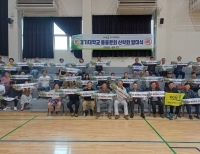 [단신] 산악회, 본교 동문의 버팀목이 될 수 있도록
[단신] 산악회, 본교 동문의 버팀목이 될 수 있도록
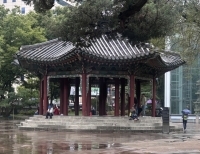 [사회메인] 노인 인구 1,000만 시대, 준비 없는 사회가 불안해
[사회메인] 노인 인구 1,000만 시대, 준비 없는 사회가 불안해
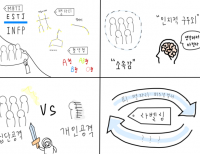 [네컷만화] 라벨링 문화
[네컷만화] 라벨링 문화
 [진리터] 결국 우리 모두 돌아볼 것이니
[진리터] 결국 우리 모두 돌아볼 것이니

 목록
목록




